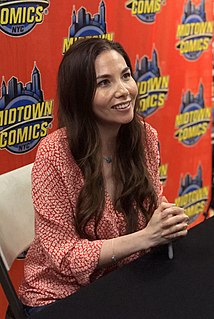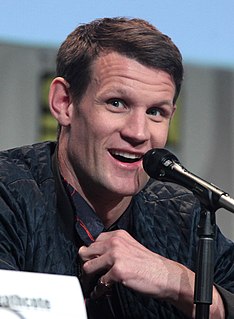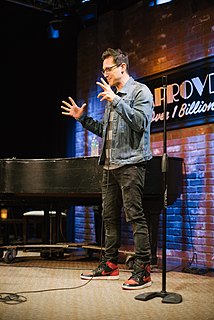A Quote by Tanya Saracho
In lots of ways, I've been trying to tell stories this way since I started writing plays: a female-centered story with queer, Latinx gaze.
Related Quotes
I started writing the book without realizing I was writing a book. That sounds stupid, but it's true. I'd been trying and failing to make a different manuscript work, and I thought I was just taking a break by writing some short stories. I'm not a very good short story writer - the amazing compression that is required for short stories doesn't come easily to me. But anyway, I thought I'd try to write some short stories. And a structure took shape - I stumbled upon it.
I started out writing romance novels, and that's a side of publishing that's very female oriented. 99.9% of the writers are women, most of the editors are women, and these are books written for the female gaze. And so my point of view - the way I looked at fandom and publishing and writing - was all about women. So for me that's what was natural, that's what was comfortable. And then I moved over to comics. And all of a sudden it was... Pardon the expression, it was a sausage fest.
The evasion of justice within academia is all the more infuriating because the course of sexual harassment is so predictable. Since I started writing about women and science, my female colleagues have been moved to share their stories with me; my inbox is an inadvertent clearinghouse for unsolicited love notes.
What does it matter, if we tell the same old stories? ...Stories tell us who we are. What we’re capable of. When we go out looking for stories we are, I think, in many ways going in search of ourselves, trying to find understanding of our lives, and the people around us. Stories, and language tell us what’s important.
I've always been a writer. I started getting paid for writing in college. Where it transitioned from commentary to journalism was in that shift - not wanting to write personal stories because people are hungry in not necessarily great ways for the sexy, sexy, sex work story. I was trying to shift the focus, and journalism was the tool I needed to write about people outside my own life and range of experience.
I've been writing for a long time, since the late '60s. But it hasn't been in the same form. I used to write scripts for television. I wrote for my comedy act. Then I wrote screenplays, and then I started writing New Yorker essays, and then I started writing plays. I didn't start writing prose, really, until the New Yorker essays, but they were comic. I didn't start writing prose, really, until the '90s. In my head, there was a link between everything. One thing led to another.
I believe in the complexity of the human story, and that there's no way you can tell that story in one way and say, 'this is it.' Always there will be someone who can tell it differently depending on where they are standing ... this is the way I think the world's stories should be told: from many different perspectives.






































